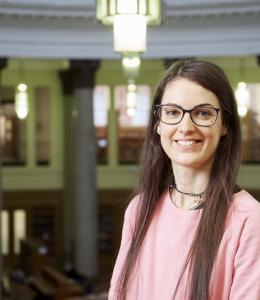
Dr Marika Ceschia
RACE.ED Archival Research Fellow, October 2023 - July 2024
Marika Ceschia is a Leeds Arts and Humanities Research Institute postdoctoral fellow at the University of Leeds, where she has been working on a new project on carceral spaces, and the interconnections between urbicide and ecocide, in African American literature. She holds a PhD in English literature from the University of Leeds, and her research focuses on the interconnections between twentieth-century American literature and motherhood. Her first academic monograph, Otherworldly Mothering, which examines African American women’s writing of the 1970s and 1980s, will be published by Louisiana State University Press in Fall 2024.
She has organized workshops and taught first- and second-year undergraduate courses in Foundations of English Studies, African American Narrative, and Race, Writing, and Decolonization. She has presented papers at the British Association of American Studies, Scottish Association of American Studies, and Irish Association of American Studies Annual Conferences, at the UCL Center for the Study of the Americas, and at the Society for the History of American Women Annual Conferences. Her research interests include postcolonial theory and literature; environmental and medical humanities; African American, Native American, and Chicano literature; gender and queer studies; Black British literature; and critical race theory.
Project title: Unsettling the Colonial Archive: Rewriting Charles Lyell’s Extractive Grammars
This project aims to uncover the erasures present in Charles Lyell’s American-related notebooks in order to understand the complex entanglements between colonialist praxes of terra- and subject-forming. What onto-epistemological assumptions link Lyell’s explorations of the natural and social environment of the Americas? Building upon my PhD research, my project proposes to develop a decolonial method of analysis informed by Black women’s writings to critically assess the colonial archive and unsettle the dynamics upon which the Plantationocene is founded.
Analysing Lyell’s American-related notebooks, I aim to uncover what Yusoff has called the “extractive grammars of geology,” which enable “a transmutation […] that renders matter as property,” severing its embeddedness in sociological and ecological fields (20). Revealing the ways in which the matricidal praxes foundational to the ontological transmutations of the Plantationocene uphold geology’s extractive grammars, I aim to demonstrate how they work to perpetuate colonialist epistemologies. I will explore how maternal erasure functions to create a colonialist subtext in the semiotics of geology: what role does maternal abjection play in the constitution of geology as a scientific discourse that, willingly or not, perpetuates racial logics? How do matricidal praxes that uphold racial terror enable the transformation of matter into property?
Offering a counterpoint to this colonial archive, the writings of Gloria Naylor are situated in a long-standing tradition of Black women’s narratives that can disrupt the matricidal praxes of the Plantationocene. Rewriting an ancestral archive of maternal praxis and positing it as a starting point to rethink a non-matricidal mode of being in the world, her narratives unsettle the economic co-optations of the maternal engendered by a colonialist epistemology. If the extractivist praxis of geology forms part of Plantationocene’s matricidal tools, how does the maternal praxis of Black women’s narratives unsettle the ontological metamorphoses of Lyell’s notebooks? How can the racial violence of the archive be addressed through an engagement with Black women’s writings?
